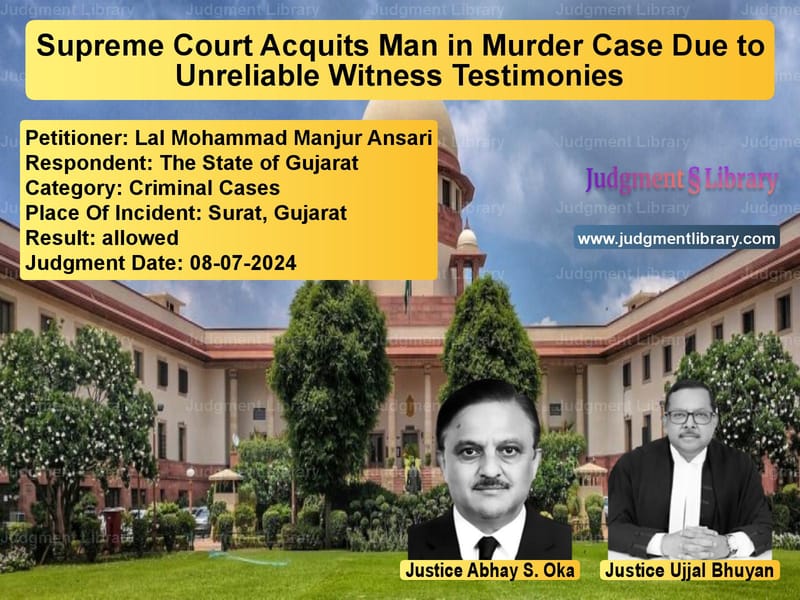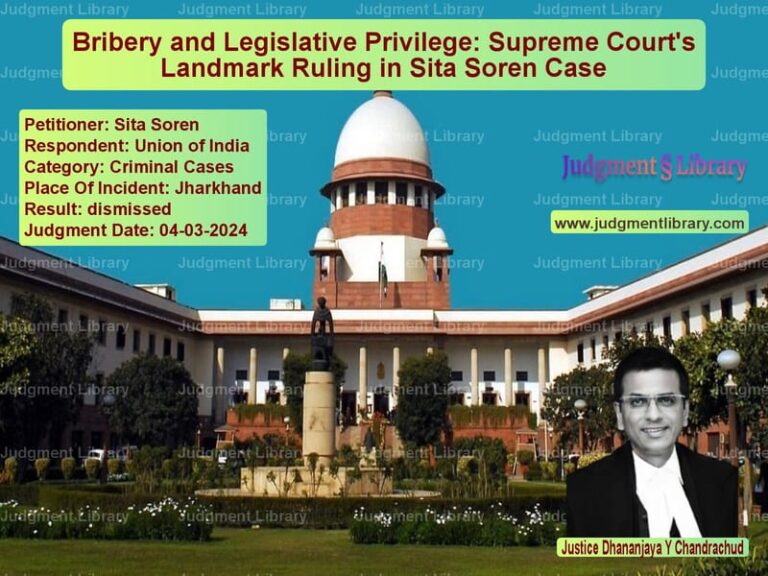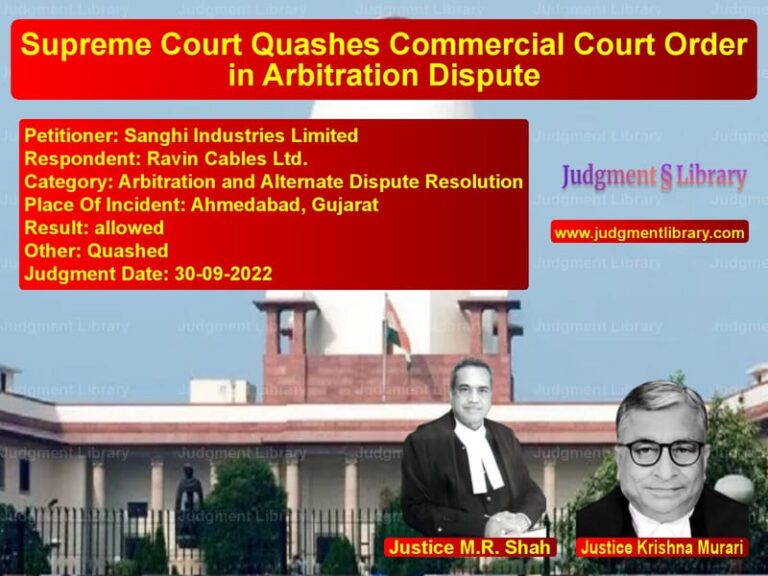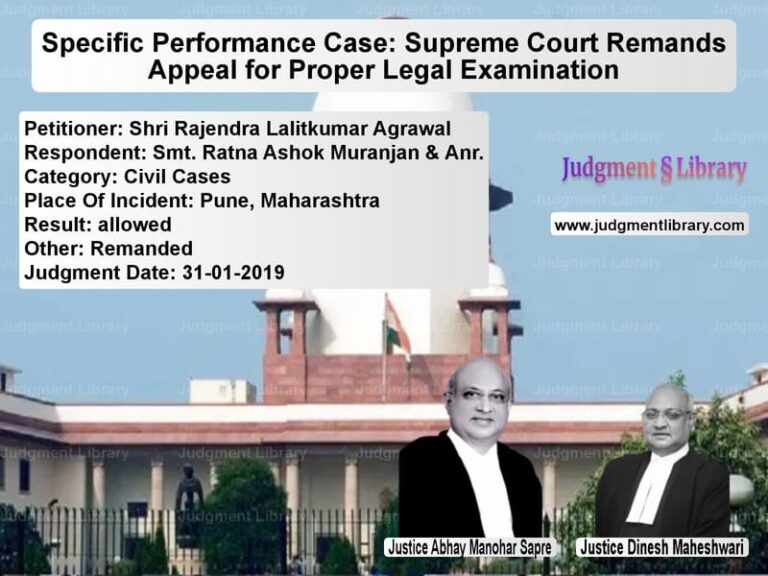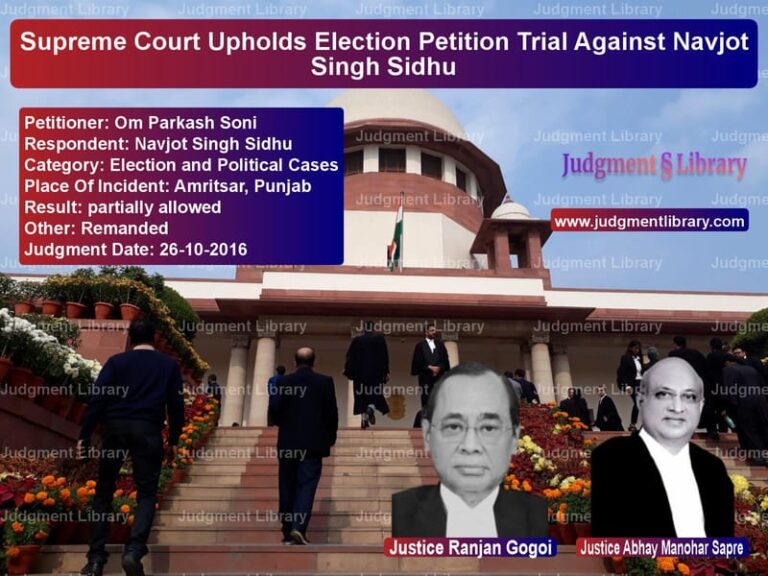Supreme Court Acquits Man in Murder Case Due to Unreliable Witness Testimonies
The case of Lal Mohammad Manjur Ansari vs. The State of Gujarat revolves around the conviction of the appellant under Section 302 of the Indian Penal Code (IPC) for the alleged murder of his roommate in Surat, Gujarat, in 2004. The Supreme Court, after reviewing inconsistencies in witness testimonies and procedural lapses in the investigation, set aside the High Court’s judgment and acquitted the accused. This ruling emphasizes the necessity of credible evidence and procedural fairness in criminal trials.
Background of the Case
The incident occurred on September 6, 2004, when the appellant, Lal Mohammad Manjur Ansari, was residing in Room No. 3 of a building owned by prosecution witness (PW-3), Alimuddin Amiruddin Shaikh. The deceased, Mohmed Akhtar Gafur Ansari, was also staying in the same room. According to the prosecution, a dispute over playing music led to an altercation, during which the appellant allegedly attacked and killed the deceased.
The case was built on testimonies from multiple witnesses, an extra-judicial confession to PW-19, and a purported dying declaration by the deceased to PW-24. The trial court convicted the appellant, sentencing him to life imprisonment. The Gujarat High Court upheld the conviction, leading the appellant to approach the Supreme Court.
Read also: https://judgmentlibrary.com/supreme-court-acquits-man-due-to-procedural-lapses-in-murder-conviction/
Petitioner’s Arguments
The appellant’s counsel raised the following points:
- Key prosecution witnesses (PW-3 to PW-9) were declared hostile, and their testimonies should not have been selectively relied upon.
- The extra-judicial confession allegedly made to PW-19 was unreliable, as there was no corroborating evidence such as call records.
- PW-19’s testimony was inconsistent, and PSI Mishra, a crucial witness who allegedly received information about the confession, was never examined.
- The dying declaration recorded by PW-24 was doubtful, as other witnesses stated that the deceased was unconscious at the time.
- The investigation was flawed, as key details regarding the accused’s arrest and custody were missing from official records.
Respondent’s Arguments
The prosecution countered the appeal with the following arguments:
- Even though some witnesses turned hostile, parts of their testimony corroborated the prosecution’s case.
- PW-19’s testimony regarding the appellant’s confession was credible, and there was no reason for the employer to falsely implicate him.
- The dying declaration given to PW-24 should be given due weight, as it clearly implicated the appellant.
- The appellant was the only person staying with the deceased at the time of the incident, which strongly indicated his guilt.
Supreme Court’s Observations
The Supreme Court critically examined the prosecution’s evidence and found several inconsistencies. The Court observed:
“The prosecution’s case is based primarily on circumstantial evidence, extra-judicial confession, and a dying declaration. However, serious procedural lapses and unreliable testimonies weaken the case beyond reasonable doubt.”
Key points noted by the Court:
- Hostile Witnesses: The testimonies of PW-3 to PW-9 were inconsistent, and selectively relying on parts of their statements was legally unsound.
- Unreliable Extra-Judicial Confession: The appellant allegedly called PW-19 and admitted to the murder, but the prosecution failed to verify the call records.
- Failure to Examine Key Witness: PSI Mishra, who supposedly received the appellant’s confession at the bus station, was not examined, making this claim unsubstantiated.
- Doubtful Dying Declaration: PW-24 claimed that the deceased named the appellant as his attacker, but other witnesses, including PW-3, stated that the deceased was unconscious at the time.
- Flawed Investigation: The arrest and custody details of the appellant were missing, raising questions about due process.
Final Verdict
The Supreme Court ruled in favor of the appellant and acquitted him, stating:
“The prosecution has failed to establish the guilt of the appellant beyond reasonable doubt. The inconsistencies in witness testimonies and lack of corroborative evidence make it unsafe to uphold the conviction.”
The Court set aside the High Court’s judgment and ordered the immediate release of the appellant unless required in any other case.
Implications of the Judgment
This ruling underscores several key legal principles:
- Necessity of Corroborative Evidence: Extra-judicial confessions and dying declarations must be corroborated by independent evidence.
- Prosecution’s Burden of Proof: The prosecution must prove guilt beyond reasonable doubt, and any inconsistencies must be resolved in favor of the accused.
- Judicial Scrutiny in Criminal Cases: Courts must carefully analyze procedural lapses and unreliable witness testimonies to prevent miscarriages of justice.
Conclusion
The Supreme Court’s decision in this case reinforces the fundamental principle that an accused is presumed innocent until proven guilty. By setting aside the conviction due to unreliable evidence and procedural lapses, the ruling highlights the judiciary’s commitment to upholding fair trial standards.
Petitioner Name: Lal Mohammad Manjur Ansari.Respondent Name: The State of Gujarat.Judgment By: Justice Abhay S. Oka, Justice Ujjal Bhuyan.Place Of Incident: Surat, Gujarat.Judgment Date: 08-07-2024.
Don’t miss out on the full details! Download the complete judgment in PDF format below and gain valuable insights instantly!
Download Judgment: lal-mohammad-manjur-vs-the-state-of-gujarat-supreme-court-of-india-judgment-dated-08-07-2024.pdf
Directly Download Judgment: Directly download this Judgment
See all petitions in Murder Cases
See all petitions in Bail and Anticipatory Bail
See all petitions in Custodial Deaths and Police Misconduct
See all petitions in Juvenile Justice
See all petitions in Attempt to Murder Cases
See all petitions in Judgment by Abhay S. Oka
See all petitions in Judgment by Ujjal Bhuyan
See all petitions in allowed
See all petitions in supreme court of India judgments July 2024
See all petitions in 2024 judgments
See all posts in Criminal Cases Category
See all allowed petitions in Criminal Cases Category
See all Dismissed petitions in Criminal Cases Category
See all partially allowed petitions in Criminal Cases Category

